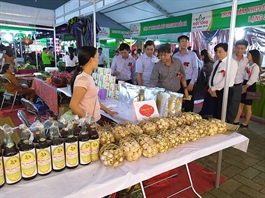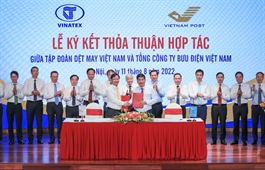Number one priority for Nghi Son refinery is to stablise cash flow: expert
Number one priority for Nghi Son refinery is to stablise cash flow: expert
Stable cash flow is key to maintaining the Viet Nam’s largest refinery - Nghi Son oil refinery’s production, said Egashira Hideaki, Investment Director of Idemitsu Kosan Company in a media briefing in Ha Noi last week.

He told the press that earlier this year, due to a lack of finance to import crude oil, Nghi Son Refinery - which accounts for 35 per cent of the domestic petroleum market - had to cut its production capacity from 105 to 80 per cent. This immediately affected the domestic petroleum supply, causing a shortage of petrol for the local market.
Egashira Hideaki noted it was very important to ensure a stable finance source for the oil refinery.
Based in central Thanh Hoa Province’s Nghi Son Open Economic Zone, the refinery boasts a capacity of 200,000 barrels of crude oil a day in its first phase, equivalent to 10 million tonnes a year. Its capability is almost double that of Dung Quat in central Quang Ngai Province, the country’s first refinery.
The US$9 billion oil refinery is 35.1 per cent owned by Japan’s Idemitsu Kosan Co, 35.1 per cent by Kuwait Petroleum, 25.1 per cent by state-run PetroVietnam and 4.7 per cent by Mitsui Chemicals Inc.
Viet Nam's Nghi Son Refinery and Petrochemical (NSRP) has been struggling because of system trouble that delayed its 2018 launch while oil product margins slumped during the COVID-19 pandemic, but the loss has shrunk, as oil prices have soared recently.
Oil prices set a new high from $60 per barrel to almost $120 per barrel making it difficult to ensure a profit margin for the refinery. In addition, the COVID-19 pandemic has also made the price of crude oil equal to the selling price of petroleum products of the refinery.
"Earlier this year, there was a time the refinery did not have enough finance to invest and buy crude oil for production," he said.
To avoid a lengthy shutdown after foreign shareholders and the Vietnam Oil and Gas Group (PVN) came to a consensus to restructure this refinery and provide short-term funding. The move has helped Nghi Son oil refinery continue operating for a short time.
Egashira Hideaki affirmed that to stabilise the finance source for this plant, it would be essential to have the consent of sponsors, shareholders, and financial institutions to finance the project and support from Viet Nam’s Government.
According to a recent report released by PetroVietnam, the petroleum production plan of Nghi Son and Dung Quat oil refineries reached 3.9 million cu.m in the third quarter of 2022 or accounting for 72 per cent of total domestic demand and will increase to 4.4 million cu.m in the fourth quarter, accounting for 80 per cent.
























